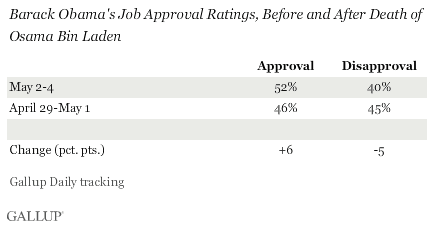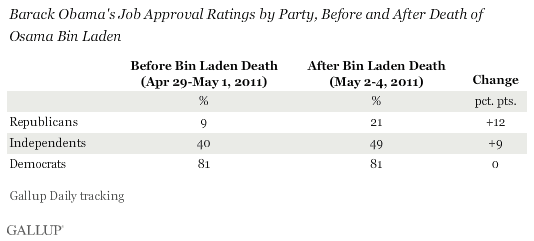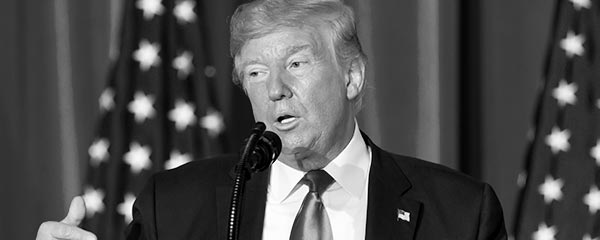PRINCETON, NJ -- Americans' approval of President Barack Obama is up six points after the death of Osama bin Laden in a U.S. raid on the al Qaeda leader's Pakistan compound. Obama averaged 46% approval in Gallup Daily tracking in the three days leading up to the military operation and has averaged 52% across the three days since.

Presidents' popular support often increases in response to major international events, commonly known as "rally events." Thus, a jump in Obama's approval after bin Laden's death is not unexpected.
The six-percentage-point increase in Obama's approval rating is fairly typical for a rally event. Gallup has compiled data on changes in presidential approval after 48 different international or domestic crises since 1950 and finds a median increase of seven percentage points.
The largest rally Gallup has ever measured was a 35-point increase for George W. Bush after the Sept. 11 terrorist attacks. Other large rally effects include an 18-point increase for George H.W. Bush at the beginning of the 1991 Persian Gulf War; a 16-point jump for Richard Nixon after the Vietnam War peace accords were signed; and 14-point increases for George H.W. Bush after the U.S. sent troops to Kuwait following Iraq's invasion of the country, and for Lyndon Johnson after he announced he was halting bombing in North Vietnam.
When the U.S. in December 2003 found and captured another "high-value target" -- former Iraqi President Saddam Hussein -- George W. Bush's approval rating rose seven points.
First Rally for Obama
Obama has not been the beneficiary of an obvious rally event in his presidency until now, even though there have been some significant international events during this time. Obama's approval rating did not change appreciably after Navy Seal snipers rescued a U.S. merchant captain held hostage by Somali pirates in April 2009, after the attempted bombing of a Detroit-bound flight on Christmas Day 2009, after the cessation of combat operations in Iraq in August 2010, and after the United States' recent participation in a military coalition in Libya.
The increase in Obama's approval rating in recent days has come exclusively among Republicans and independents, with a 12-point increase among Republicans and a 9-point rise among independents. Democrats' approval rating of Obama has not changed over this time period.

Implications
The U.S. military operation that resulted in the death of Osama bin Laden is a major milestone in Obama's presidency, and now a majority of Americans approve of the job he is doing, and more than at any time since May 2010. The question is whether Obama can sustain that higher level of support, or whether it will quickly dissipate. Most often, a president's approval rating begins to decline fairly soon after the rally event occurs, with the increases in approval often disappearing in as little as one to four weeks.
Explore President Obama's approval ratings in depth and compare them with those of past presidents in the Gallup Presidential Job Approval Center.
Survey Methods
Results for this Gallup poll are based on telephone interviews conducted May 2-4, 2011, on the Gallup Daily tracking survey, with a random sample of 1,558 adults, aged 18 and older, living in all 50 U.S. states and the District of Columbia.
For results based on the total sample of national adults, one can say with 95% confidence that the maximum margin of sampling error is ±3 percentage points.
Interviews are conducted with respondents on landline telephones and cellular phones, with interviews conducted in Spanish for respondents who are primarily Spanish-speaking. Each sample includes a minimum quota of 400 cell phone respondents and 600 landline respondents per 1,000 national adults, with additional minimum quotas among landline respondents for gender within region. Landline telephone numbers are chosen at random among listed telephone numbers. Cell phone numbers are selected using random-digit-dial methods. Landline respondents are chosen at random within each household on the basis of which member had the most recent birthday.
Samples are weighted by gender, age, race, Hispanic ethnicity, education, region, adults in the household, and phone status (cell phone only/landline only/both, cell phone mostly, and having an unlisted landline number). Demographic weighting targets are based on the March 2010 Current Population Survey figures for the aged 18 and older non-institutionalized population living in U.S. telephone households. All reported margins of sampling error include the computed design effects for weighting and sample design.
In addition to sampling error, question wording and practical difficulties in conducting surveys can introduce error or bias into the findings of public opinion polls.
For more details on Gallup's polling methodology, visit www.gallup.com.
